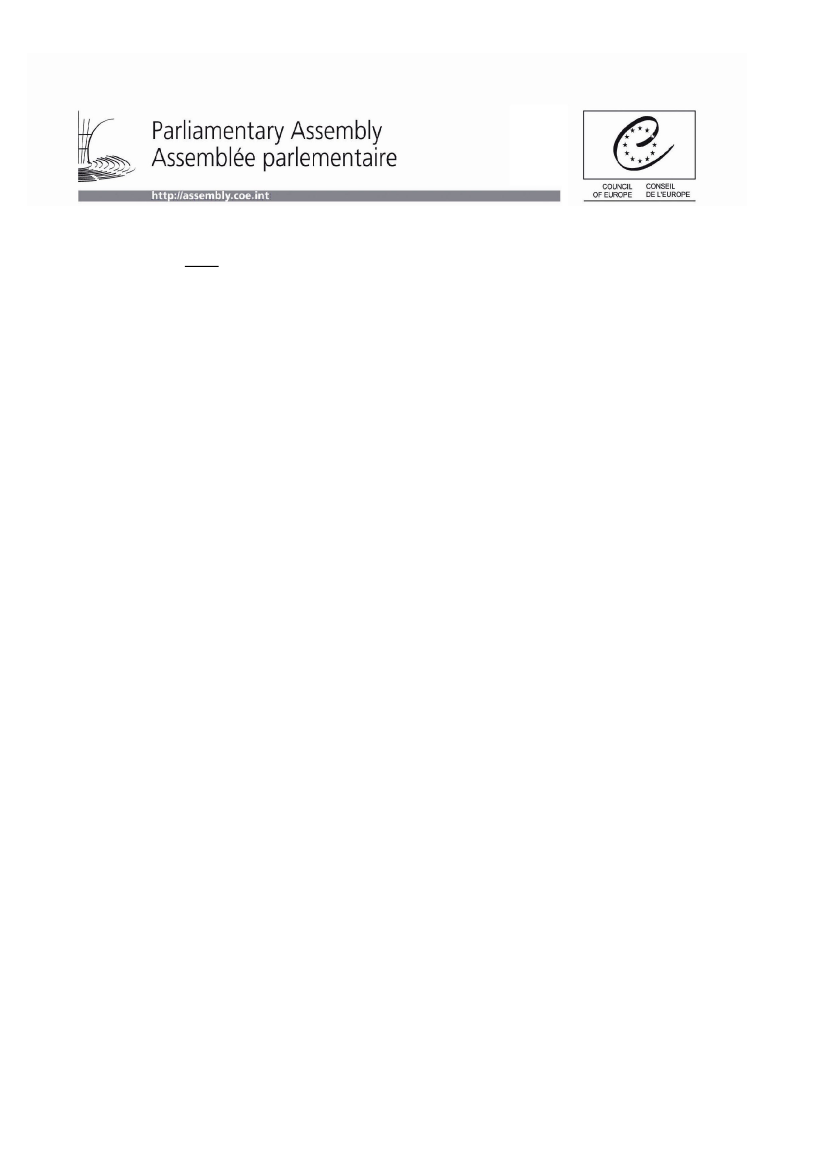OSCEs parlamentariske Forsamling 2009-10
OSCE Alm.del Bilag 22
Offentligt
AS/BUR/Ukraine (2010)122 January 2010 17:00
Observation of the Presidential Election in Ukraine – 17 January
2010
ReportAd hoc Committee of the Bureau of the AssemblyRapporteur: Mr Mátyás Eörsi, Hungary, Alliance of Liberals and Democrats for Europe (ALDE)I.Introduction1.At its meeting on 2 October 2009, the Bureau of the Assembly decided to set up a 40-member ad hoccommittee to observe the Presidential election in Ukraine scheduled for 17 January 2010, and also authorisedan enlarged pre-electoral mission consisting of 11 Assembly members, taking into account the D’Hondt rule. On16 October 2009 the President of the Ukrainian Verkhovna Rada, Mr Lytvyn, invited the Parliamentary Assemblyto observe the presidential election. The President of the Assembly appointed Mr Mátyás Eörsi Chairperson andRapporteur of the ad hoc committee.2.On 4 October 2004 a co-operation agreement was signed by the Parliamentary Assembly and theEuropean Commission for Democracy through Law (“Venice Commission”). In accordance with Article 15 of thisagreement, “whenthe Bureau of the Assembly decides to observe an election in a country in which electorallegislation was previously examined by the Venice Commission, one of the rapporteurs of the VeniceCommission on this issue may be invited to join the Assembly’s election observation mission as legal adviser”,the Bureau of the Assembly invited a Venice Commission member to join the ad hoc committee as adviser.3.Drawing on the proposals put forward by the Assembly political groups, the ad hoc committee wasconstituted as follows:Mátyás EORSI, Hungary, ALDE, Head of DelegationGroup of the European People’s Party (EPP/CD)Renato FARINADenis JACQUATCorien JONKER*Anna LILLIEHÖÖKKrasimir MINCHEVMarietta de POURBAIX-LUNDIN*Fran§ois ROCHEBLOINEKimmo SASIMustafa ÜNALEgidijius VAREIKISPiotr WACHRenate WOHLWEND*ItalyFranceNetherlandsSwedenBulgariaSwedenFranceFinlandTurkeyLithuaniaPolandLiechtenstein
1
Socialist Group (SOC)AnnaČURDOVÁ*Andreas GROSSSabir HAJIYEVSinikka HURSKAINENTadeusz IWIŃSKI*Mogens JENSENPietro MARCENARORené ROUQUETIndrek SAAR*Rainder STEENBLOCKLord TOMLINSONCzech RepublicSwitzerlandAzerbaijanFinlandPolandDenmarkItalyFranceEstoniaGermanyUnited Kingdom
Alliance of Liberals and Democrats for Europe (ALDE)Hendrik DAEMSMátyás EÖRSI*Michael HANCOCKKerstin LUNDGRENBernard MARQUETAndrea RIGONIPaul WILLEEuropean Democrat Group (EDG)David WILSHIREDavit HARUTYUNYAN *Oleg LEBEDEVSergey MARKOVGanira PASHAYEVATuğrul TÜRKEŞ*Unified European Left Group (UEL)Jaakko LAAKSOVenice CommissionSrdjan DARMANOVICSecretariatVladimir DRONOV, Head of secretariat, Inter-Parliamentary Co-operation and Election Observation UnitChemavon CHAHBAZIAN, Deputy Head, Inter-Parliamentary Co-operation and Election Observation UnitPierre GARRONE, Head of the Elections and Referendums Division, Venice CommissionBastiaan KLEIN, Secretary of the Monitoring CommitteeAngus MACDONALD, Communication UnitFranck DAESCHLER, Secretariat of Interparliamentary co-operation and Election observationsDaniele GASTL, Secretariat of Interparliamentary co-operation and Election observations(*)pre-electoral mission (24-26 November 2009)4.The ad hoc committee was acting as part of the International Election Observation Mission (IEOM),which also comprised delegations from the OSCE Parliamentary Assembly (OSCE PA), the EuropeanParliament (EP) and the NATO Parliamentary Assembly (NATO PA), as well as the election observation missionof the Organisation for Security and Co-operation in Europe / Office for Democratic Institutions and HumanRights (OSCE/ODIHR).MontenegroFinlandUnited KingdomArmeniaRussian FederationRussian FederationAzerbaijanTurkeyBelgiumHungaryUnited KingdomSwedenMonacoItalyBelgium
2
5.The ad hoc committee met in Kyiv from 14 to 18 January 2010 and met with the main candidates for thepresidential election and/or their representatives, the Vice-President of the Central Electoral Commission (CEC),the Head of the OSCE/ODIHR election observation mission and his team, the representative of the CoESecretary General in Ukraine, representatives of the international community and representatives of civil societyand the mass media. The programme of the ad hoc committee’s meetings appears in Appendix 1.6.On election day, the ad hoc committee split up into 22 teams to observe the elections in the cities ofKyiv, Dnepropetrovsk, Kharkiv, Odessa and Simferopol and their surrounding areas.7.With a view to assessing the organisation of the election campaign and the political climate in the run-upto the elections, the Bureau sent a pre-electoral mission to Ukraine from 24 to 27 November 2009. The cross-party delegation comprised Mátyás Eörsi, Head of Delegation (Hungary, ALDE), Corien Jonker, (Netherlands,EPP/CD), Marietta de Pourbaix-Lundin (Sweden, EPP/CD), Renate Wohlwend (Liechtenstein, EPP/CD), AnnaĆurdová (Czech Republic, SOC), Tadeusz Iwiński (Poland, SOC), Indrek Saar (Estonia, SOC),DavitHarutyunyan (Armenia, EDG) and Tuğrul Türkeş (Turkey,EDG). Unfortunately, no member of the UnifiedEuropean Left (UEL) group was available to represent this group on the delegation. During its visit to Kyiv, thepre-electoral delegation met the President of Ukraine, the President of the Constitutional Court, members of theUkrainian delegation to the Parliamentary Assembly of the Council of Europe (PACE), members of the CentralElectoral Commission (CEC), main candidates for the presidential election and/or their representatives, the Vice-Minister of the Interior and representatives of the media, civil society and the international community. The textof the declaration issued by the pre-electoral mission appears in Appendix 2.8.In the declaration issued the day after the presidential election, the IEOM unanimously concluded that“the first round of Ukraine’s presidential election was of high quality and showed significant progress overprevious elections, meeting most OSCE and Council of Europe commitments”. The IEOM press release issuedafter the elections appears in Appendix 3.9.The ad hoc committee would like to thank Ambassador Ake Peterson, the representative of theSecretary General of the Council of Europe in Kyiv, and his team, and the OSCE/ODIHR election observationmission for their co-operation and support.II.Political and legal framework
10.Ukraine has no unified electoral code. There are too many laws governing elections, and they areunnecessarily complex and unclear; furthermore, they often contradict each other. This is why the ParliamentaryAssembly and the Venice Commission have repeatedly advised the Ukrainian authorities to develop and adopt aunified and simplified electoral code.11.The Verkhovna Rada has set up a special working group comprising representatives of all the partiesrepresented in Parliament and outside experts to prepare a draft unified Electoral Code, in co-operation with theVenice Commission. However, the members of this working group have been unable to meet in recent monthsbecause of the political climate prevailing in the country in the run-up to the presidential election. The membersof the working group are hoping that following the presidential election they will once again encounter theconditions for achieving consensus among the main political forces in the country and that the work on the draftElectoral Code will now be able to continue.12.On 24 July 2009, during an extraordinary session and at the third and last reading, the Verkhovna Radaadopted several amendments to the electoral legislation, including the Law on Elections of the President.President Yuschenko vetoed these amendments, but the Parliament managed to overcome the Presidential vetoby adopting the amendments on a 2/3 majority.13.President Yuschenko and 48 Members of Parliament appealed to the Constitutional Court, which, on 19October 2009, invalidated the following amendments, declaring them unconstitutional:the fact that Ukrainian nationals residing abroad are required to register with the relevant UkrainianConsulate in order to exercise their right to vote;the fact that members of the regional and district electoral commissions are required to reside in thecorresponding region or district;
3
the provisions prohibiting the filing of complaints with the Central Electoral Commission on the day of theelection and the days immediately following it;the provisions authorising the courts to discontinue examining any complaint concerning the electoralprocess, two days before the election;the provisions prohibiting any judicial challenge to the results of the voting as established by the regionaland district electoral commissions.
14.The Constitutional Court decision specified that these provisions would not be applied during the 17January presidential election. However, it would be legitimate to wonder which provisions will be used to dealwith any questions raised, particularly in connection with complaint and appeal procedures. Consequently, thefact that these provisions are excluded from the law does not rule out the possibility of abuse being committedduring the electoral process.15.In its joint opinion with the OSCE/ODIHR, adopted on 12 October 2009 (CDL-AD (2009) 040) on theamendments to legislative acts on the presidential election in Ukraine, the Venice Commission concluded thatsome amendments did not comply with international standards and good practices in electoral matters. TheVenice Commission identified the following problems, among others:the obligation on district electoral commissions to issue the results of elections without taking account ofannulments of the voting by a number of regional electoral commissions in the corresponding territory;the reduced time-limit for filing complaints (cut from 5 to 2 days);the fact the electoral commissions may, on election day, add voters’ names to lists that have alreadybeen established;the limitation of the matters on which complaints can be filed with the higher electoral commissions(including the Central Electoral Commission), even where these matters are subject to a judicial appeal;the prohibition of independent Ukrainian observers;the excessive amounts to be deposited in guarantee by presidential candidates (equivalent to €208 000);the lack of clarity in the rules on replacing members of electoral commissions;the lack of transparency in political party and campaign funding.
16.One of the most worrying of the provisions which the Constitutional Court failed to invalidate is the oneallowing electoral commissions to add, on election day, names to established voter lists, because this increasesthe risks of electoral fraud and is contrary to the Parliamentary Assembly’s recommendations. It is especiallydisturbing as the party of one presidential candidate has claimed that almost 500 000 electors “disappeared”from the lists in areas where this party traditionally enjoys very strong support.17.On 28 December 2009 President Yuschenko, a presidential candidate, sent a letter to the President ofthe Parliamentary Assembly voicing his concern about possible tampering with voter lists by adding names onelection day. On 8 January 2010 the Prime Minister, Ms Timoshenko, another presidential candidate, sent aletter to the international observers sharply criticising the Central Electoral Commission’s decision to authorisehome voting without the requisite medical certificate.18.In addition to these specific concerns, there are others concerning restrictions on remedies before thecourts vis-à-vis the electoral process and on the general right to challenge the elections, as well as provisions onvote counting and the determination of the election results, which provisions came into force in July 2009 andwere not challenged by the Constitutional Court. These provisions theoretically provided for the possibility ofdeclaring the election of a specific presidential candidate,inter aliain cases of serious doubts as to the validity ofthe results and allegations of massive electoral fraud. The events during the 2004 presidential elections clearlypoint to the risks inherent in these provisions.19.Another subject for major concern is the status of domestic observers. According to the current electorallaw, domestic observers cannot observe the 17 January elections. The only persons authorised to observe theelections are representatives of the political parties, presidential candidates and the international observers.This situation is particularly unacceptable in that domestic observers were very active during the previouselections in Ukraine, when the quality of their work and their civic commitment were widely acknowledged by theUkrainian public and the international community. In its joint opinion with OSCE/ODIHR, adopted last October,the Venice Commission strongly recommended reintroducing the right of observation for domestic observers.
4
20.Last November the Verkhovna Rada adopted at first reading a bill taking account of most of therecommendations set out in the joint Venice Commission/OSCE/ODIHR opinion, but this bill did not obtain therequisite majority at second reading. Later, at the beginning of December 2009, the authorities attempted toadopt a compromise text amending the current electoral law, in order to go back on the Constitutional Courtdecision and put an end to the Venice Commission’s concerns. However, this attempt failed owing to oppositionfrom the Party of the Regions and the Yulia Tymoshenko Bloc. Consequently, the 17 January presidentialelection was organised on the basis of the law adopted in July 2009, with the exception of the provisionsdeclared unconstitutional under Constitutional Court Decision No. 26 of 19 October 2009.21.Lastly, for lack of time, the members of the electoral commissions of different levels had to implementthe amended legislation without having received any training in procedures. This also concerns theadministrative courts.III.Registration of candidates and voter lists
22.Registration of candidates for the presidential election of 17 January 2010 began on 20 October andended on 13 November 2009. The CEC registered 18 candidates in the course of a process which proved on thewhole to be inclusive and transparent, offering voters a wide range of candidates, including four women. Whatmakes the presidential election in Ukraine politically unique is that the current President of Ukraine, the PrimeMinister and the President of the Verkhovna Rada were all candidates.23.Every candidate in the presidential election is under an obligation to provide the CEC with a certainnumber of documents, including a financial document certifying the deposit of the sum of 2.5 million UAH(roughly 208 000 Euros). This sum will be refunded only to candidates who reach the second round of theelection. It should be noted that the law is not explicit regarding the eventuality of no second round taking place.The Venice Commission, in its joint opinion with the OSCE/ODIHR adopted on 12 October 2009, criticised theexcessive amount of the financial deposit required from candidates.24.The CEC refused to register another 40 candidates for various reasons: non-payment of the guaranteedeposit, incorrect personal details, failure to meet the deadline for submission of documents. 18 of the rejectedcandidates lodged complaints with the Administrative Court in Kyiv. These complaints were unsuccessful.25.The Verkhovna Rada adopted the Law on the State Register in February 2007, but it did not come intoforce until 1 February 2007. For the first time, therefore, elections took place with voter lists drawn up on thebasis of electronic data. The CEC is responsible for updating the lists of the state register. The state registerdatabase was compiled on the basis of the voter lists used for the 2006 and 2007 elections.26.The number of voters registered on the lists is 36,298,991. 592 805 duplications were removed inrelation to the voter lists used for the last elections in 2007. According to representatives of the “Party of theRegions”, a considerable number of voters removed from the lists were from regions which traditionallysupported their party. According to the authorities, this was the result of updating of the database to avoidduplications. As regards the number of voters in other countries, CEC estimates put the figure at around 360000.27.On 27 December 2009, the district electoral commissions (DECs) began forwarding the preliminary voterlists to the precinct electoral commissions (PECs), where they could be inspected by voters. The voter lists ofsome 1000 PECs were reportedly reprinted following technical errors. This represents around 3% of all PECs.The deadline for correcting the preliminary lists was 10 January 2010.28.The voter lists could create problems at polling stations on election day, both for voters and forcommission members. According to the Venice Commission’s opinion, legal provisions allowing new voters to beentered on the lists on election day could undermine the credibility of the final election results in some regions ofUkraine.IV.Election administration
29.The presidential election was administered by a three-tier election administration composed of theCentral Electoral Commission (CEC), 225 district electoral commissions (DECs) and 32 087 precinct electoral
5
commissions (PECs). In addition to these, 1497 special electoral commissions were set up in hospitals andprisons, and 113 PECs were formed to organise the election in other countries.30.The CEC is a permanent body consisting of 15 members appointed by the parliament for a seven-yearterm of office. Since the political agreement of 27 May 2007, the CEC has been composed entirely ofrepresentatives of the parties which were present when the outgoing parliament was formed, with 8 membersnominated by the government parties and 7 by opposition parties. The agreement also stipulates that the Chairof the CEC must be elected from among the members representing the opposition and its Secretary from amongthose representing the government parties.31.The composition of the DECs and PECs is also regulated by the amendments to the electoral lawstipulating that electoral commissions must be composed entirely of representatives of the parties present whenthe outgoing parliament was formed. The DECs have 18 members, with equal numbers of opposition party andgovernment party representatives, which share the chairmanships of the commissions. The PECs have 9 to 23members and their chairmanships are divided proportionally among the parliamentary parties.32.The CEC functioned in an efficient and generally transparent manner. However, meetings were held incamera when politically sensitive issues were brought up for discussion, in order to work out compromises andpresent co-ordinated positions. But it was not possible to hold in-depth discussions at these closed meetings;they served rather to take decisions according to the commission members’ political affiliations. This mode ofoperation of the CEC was not in conformity with the electoral legislation and did not contribute to greatertransparency of its proceedings.33.Each candidate could appoint two representatives to the 225 DECs. Only 9 candidates were able toappoint the maximum number of representatives to the DECs, ie 450 members. Although, when the appointmentof DEC members began on 27 November 2009, the principle of proportionality was observed, later, because ofchanges in the commissions, the CEC decided that it was not possible to observe this principle. As a result, thefour main candidates, namely Mr Yanukovych, Ms Timoshenko, Mr Yatsenyuk and Mr Yuschenko, were over-represented on the DECs.34.The appointment of members of the PECs was more complex because of the changes after a largenumber of commission members were forced to resign. The main reason for this situation was insufficientremuneration due to late transfer of the budgetary resources in December 2009. Some PECs were unable tomeet the deadlines because of problems in attaining a quorum or the resignation of their chairs. There werecases in which the preliminary voter lists were not made available for inspection by voters within the deadlineset.V.Election campaign and the media
35.The election campaign began on 19 October 2009. It took place in a climate of calm and of freecompetition. The 18 candidates could be divided into three categories according to their effective presenceduring the campaign: candidates who were active in the campaign and very well represented at all levels of theelectoral commissions; candidates who were relatively active in the campaign but very poorly represented in theelectoral commissions, and the last category of candidates who were not prominent in the election campaign butwhose representatives were very much present in the electoral commissions.36.In this connection, it is important to note that, during the pre-election mission in November 2009, thefollowing concerns were raised by some of the persons with whom discussions were held: the presence of so-called “technical” candidates who play the game of the main candidates by using airtime on the public televisionchannels and appointing representatives to the electoral commissions, but who do not aim to reach the secondround and lack the potential to do so. This form of political speculation, even if it is not against the law, andsociety’s disappointment following the high hopes of rapid and positive change raised by the “orange revolution”seriously undermine the electorate’s confidence in the democratic electoral process.37.The OSCE/ODIHR mission observed cases of misuse of administrative resources and involvement ofstate officials in the election campaign. Some candidates took advantage of their office to conduct theircampaign, which is a breach of electoral legislation. For example, candidates Timoshenko and Yuschenko usedofficial visits related to the offices they hold to pursue their election campaigns. The Government PensionsAgency sent letters to all pensioners explaining that under the draft legislation sponsored by the Party of the
6
Regions, pensions would not be increased. In the same letter, the Agency explained that the presentgovernment had managed to increase pensions even under economic crisis conditions, and promised to raisepensions in 2010. The ad hoc committee was also informed of cases in which food had been distributed toelderly persons.38.The government of Prime Minister Timoshenko, a candidate in the presidential election, decided thatPEC members accepting home votes without a medical certificate would not be paid for their work. She alsothreatened them with criminal investigations. In addition to this, she gave instructions to the Minister of theInterior to check all requests concerning home voting, which constitutes direct interference by the government inthe electoral process.39.Most of the persons with whom discussions were held during pre electoral mission thought that therewould not be any electoral fraud on the actual day of the election. But democratic elections are not confined toproper conduct of the election on the actual day. The authorities of the country and all political players have amajor responsibility: ensuring that the necessary conditions are met to enable all citizens of Ukraine to expresstheir will freely.40.Another feature of the election campaign was the close interconnection between politics and financeand, generally, the role of money and oligarchies. This has always been a reality of modern Ukrainian politicallife, but it apparently took on much more disturbing proportions during this election campaign. A considerablenumber of voters felt that everything is decided in advance and that it is always the same people – those with themoney – who decided who is going to govern the country. A considerable number of citizens saw politicalcontests not as a competition between ideas and platforms, but as a competition between different clans andtheir financial interests. This political cynicism represents a real danger to democracy in Ukraine and isunacceptable in the context of the country’s serious social and economic problems.41.The ad hoc committee received disturbing information about the negative campaigning by somecandidates. It was particularly concerned about hate speech, even if there only isolated instances, and aboutanti-Semitic slurs. In this connection, the ad hoc committee considered the amendment to the Criminal Code onfighting against discrimination and hate speech to be a very positive development. This amendment came intoforce on 5 November 2008 after being signed by President Yuschenko.42.Media coverage of the election campaign is regulated by electoral legislation which guarantees allcandidates direct access to the media. While welcoming the pluralism of opinions and freedom in the media andthe considerable improvement in the situation since the previous elections, the ad hoc committee notes theunprecedented influence of the world of finance and business on the work of the media. The amendment to theelectoral law abolishing the limit on spending by candidates was criticised by the Venice Commission in itsopinion last October.43.Nevertheless, the election campaign took place in a vibrant media environment. The public mediaoffered all the candidates in contention free publicity and airtime, in accordance with the law. Although theclimate was positive on the whole, some concerns remain, due inter alia to the lack of transparency concerningshareholding in the media sector.VI.Election day – vote counting and determination of the results
44.The election took place in a calm and orderly climate and was conducted openly and, on the whole,efficiently. The ad hoc committee’s 22 teams who observed the election in the cities of Kyiv, Dnepropetrovsk,Kharkov, Odessa and Simferopol and their surrounding areas noted the excellent organisation of the electionand the vote counting. The members of the ad hoc committee mentioned a number of minor problems: lack ofknowledge of voting procedures at some polling stations, mainly in villages; inaccuracies in voter lists,nervousness at some polling stations because of the presence of international observers, and poor materialconditions in a number of polling stations. Based on the assessments of IEOM observers at the 97% of pollingstations visited, the voting process was rated “good” or “very good”.45.According to the preliminary results announced by the CEC, Mr Yanukovych obtained 35.33% of thevotes cast; Ms Timoshenko 25.02%, Mr Tigipko 13.01%, Mr Yatsenyuk 6.95%, Mr Yuschenko 5.49%, MrSimonenko 3.55%, Mr Lytvyn 2.34%, Mr Tyangnibok – 1.44% ; Hritsenko – 1.20%. The other candidates
7
obtained less than 1%. The two best-placed candidates, Victor Yanukovych and Yulia Timoshenko, will takepart in the second round of the presidential election scheduled for 7 February 2010.VII.Conclusions and recommendations
46.The ad hoc committee of the Parliamentary Assembly concluded that the first round of the presidentialelections in Ukraine had been of high quality, showed significant progress over previous elections and compliedwith the majority of Council of Europe standards. The citizens of Ukraine were able to make their choice freely infull knowledge of the facts. Voting took place in a calm atmosphere, was transparent and well organised. The17 January vote confirmed once again the positive trend seen since 2006 in the organisation of elections inUkraine.47.The ad hoc committee notes that the CEC functioned effectively, generally transparently, in a complexpolitical environment with unclear electoral laws.48.The ad hoc committee welcomes the fact that the Ukrainian electorate had a wide choice among 18presidential candidates. The results of the first round saw the emergence, alongside the two favouritecandidates, of the third candidate, Mr Tigipko with an unexpected result which, ultimately, could change themindset of the traditional confrontation between the two camps, the Party of the Regions and the “OrangeRevolution”.49.The ad hoc committee voices its concern about the presence of certain so-called “technical” candidateswho play the game of the main candidates by using airtime on the public TV channels, appointingrepresentatives on the electoral commissions, but who have no aim of or potential for reaching the second roundof elections. The ad hoc committee believes that this sort of political speculation, legal though it may be,seriously undermines the confidence of the electorate in the democratic electoral process.50.The ad hoc committee is genuinely concerned about the place of money and oligarchies in politics inUkraine in general and in the election process in particular. This aspect apparently took on a much moreworrying dimension during the election campaign. Many citizens do not see the political “contest” as acompetition between platforms and ideas, but between different clans and their financial interests. The ad hoccommittee feels that this political cynicism constitutes a real danger for democracy in Ukraine and is totallyunacceptable taking into consideration the serious socio-economic problems facing the country.51.With regard to the media, the ad hoc committee draws attention to a media environment which hasbecome increasingly more vibrant from one election to another. The public media offered all the candidates freepublicity and airtime, in accordance with the law. Nonetheless, there remain serious concerns regarding the lackof transparency associated with media shareholding and the unprecedented influence of the financial andbusiness sector on the work of the media. In this connection, the amendment of the electoral law last October,abolishing the limit on expenditure by candidates during electoral campaigns, did not make things easier.52.The ad hoc committee wishes to stress that stable election legislation is an essential prerequisite for theholding of democratic elections. Although the 17 January 2010 vote showed the democratic nature of theelections, the ad hoc committee could not fail to note a dangerous trend among Ukrainian politicians, namelythat of playingwiththe electoral rules rather than playingbythose rules. It is not normal to have a situation inwhich the election legislation is constantly being amended, including during an election campaign that hasalready begun.53.Ukraine does not have a unified electoral code. There are too many laws governing the elections, theyare unnecessarily complex and unclear; moreover, they often contradict each other. Which is why theParliamentary Assembly had asked the Ukraine authorities to pursue their co-operation with the PACEMonitoring Committee and the Venice Commission in the assessment of the country’s electoral legislation wellbefore the elections of 2009 – 2010.54.The Parliamentary Assembly’s ad hoc committee calls on the Ukrainian authorities, in close co-operationwith the Assembly’s Monitoring Committee and the Venice Commission, and well ahead of the next elections, totake practical measures to draw up and adopt a unified electoral code bringing together all the electionlegislation and fully in line with the European electoral heritage, as developed in particular in the Code of GoodPractice in Electoral Matters.
8
55.In this context, the ad hoc committee calls on the Ukraine authorities to amend the legislation onpresidential elections on the basis of the joint opinion of the Venice Commission and the OSCE/ODIHR (CDL-AD(2009)040), and in particular to re-examine:Provisions concerning the right to stand as candidate, including the excessive amount of the electoraldeposit;The provisions governing the determination of the final election results by the Central ElectoralCommission;The arrangements for appointing the members of the electoral commissions and the provisions relatingto the activities and voting procedures of those commissions;The changes to the voting procedures of electoral commissions that could lead to abuses;The possibility to make changes in the voter list up to one hour before the close of the poll;The restrictive media provisions that can be applied to limit the full exchange of political views anddelivery of campaign messages from candidates to voters;The campaign finance provisions; the legislation on the funding of political parties should also bereviewed in order, in particular, to ensure the transparency of this funding;The failure of the law to include a role for non-partisan domestic observers;The provisions concerning the invalidation of results and recount of votes, which should be clarified andamended.
9
Appendix 1AD HOC COMMITTEE FOR THE OBSERVATIONOF THE PRESIDENTIAL ELECTION IN UKRAINE14 – 18 January 2010PROGRAMMEThursday, 14 January 2010Arrival of the delegation. Members will be met at the airport and taken to their hotel:Hotel Dnipro1/2 Kreschatik StKyiv, 01001, UkraineTelephone: +(380 44) 254-6777Fax: +(380 44) 254-6737 or 254-67656 pmAd hoc committee meeting(Hotel Dnipro)- Opening of the meeting and information following the pre-electoral mission by Mr M. Eorsi,Head of the Delegation- Ambassador A. Peterson, Representative of the Secretary General of the Council of Europein Ukraine – pre-electoral political situation- Mr S. Darmanovic, expert and Mr P. Garrone, Head of the Elections and ReferendumsDivision, Venice Commission – Recent developments in the field of election legislation- Practical and logistical information by the Secretariat
Friday, 15 January 20109 amJoint parliamentary meeting(Hotel Radisson)
Opening by the heads of delegations (PACE, OSCE PA, NATO PA, EP) (venue: Hotel Dnipro)Comments from representatives of the OSCE, CE, European Commission9.30-11 am11-11.30 amBriefing by the ODIHR Election Observation MissionAmbassador H. Tagliavini and his co-ordination teamMeeting with candidate V. Yuschenko
11am–12 noon Meeting with candidate A. Yatseniuk12-12.30 pm12.30-1 pm1 – 2.30 pm2.30 – 3 pm3 – 3.30 pm3.30 – 4 pm4 – 4.30 pmMeeting with candidate HrytsenkoMeeting with candidate O. MorozLunchMeeting with candidate V. YanukovychMeeting with candidate LytvynMeeting with candidate Y. TymoshenkoBreak
10
4.30 – 5.15pm Meeting with the Central Electoral commission (CEC)5.15 – 6 pm7.30 pmMeeting with representatives of NGOs and the mediaPre-deployment meeting for teams deployed outside Kyiv(Hotel Dnipro)
Saturday, 16 January 2010Deployment in the regions for members deployed outside Kyiv9.30-11 am11 amMeeting with long-term observers for Kyiv(Hotel Radisson)
Meeting with drivers and interpreters for teams in the Kyiv region
Sunday, 17 January 2010Observation of the presidential electionsMonday, 18 January 20108 am3 pmDebriefing of the ad hoc committeeJoint press conferenceDeparture of delegation members(Hotel Dnipro)(Hotel Premier Palace)
11
Appendix 2Ukraine: Statement by PACE pre-election delegationKyiv, 26.11.2009 – The Council of Europe Parliamentary Assembly (PACE) pre-election delegation observed anoverall free and competitive atmosphere in Ukraine in the run-up to the 17 January 2010 Presidential election.The situation regarding the freedom of the media improved significantly after the 2004 elections. The delegationnotes the commitment and endeavours of journalists, although it recognises that the media works under heavyfinancial and business influences. In order to assist more efficiently the Ukrainian people to make a well-founded choice, politicians should have no role in setting the agenda for the media. Intimidation is, hopefully, athing of the past. The Central Election Commission assured the delegation that voters’ lists are being improvedalthough the delegation remains uncertain as to the state of progress in this area.At the same time, the delegation is concerned over dwindling public confidence of an electorate whose highexpectations of a rapid change had not been met. As a result, political cynicism is on the rise. The delegation isconcerned about the strong interconnection between politics and financial flows. The political struggle is widelyregarded as a struggle of personalities, ambitions and financial interests rather than a competition of politicalplatforms and ideas. The delegation was upset by the information it received about negative campaigning bycandidates; a particular source of concern was the use of hate-speech and anti-Semitic slurs. The delegationexpects such incidents to be condemned by political players.Despite repeated Council of Europe recommendations, Ukraine’s electoral legislation, although improved, is stillnot fully compatible with Council of Europe standards. The proposed July amendments to the relevant legislationmarked a step backwards in some aspects of the electoral legislation.Nonetheless, given the little time left, this delegation believes that, with true political will, the existing legislation,flawed as it is, could still create a functioning framework for this election. The delegation urges political parties inUkraine to bring the electoral legislation in line with Council of Europe standards rapidly after the new Presidenttakes up office and not only weeks before the next vote.1
1
Mátyás Eörsi, Head of Delegation (Hungary/ALDE), Corien Jonker (The Netherlands, EPP/CD), Marietta de Pourbaix-Lundin (Sweden, EPP/CD), Renate Wohlwend (Liechtenstein, EPP/CD), Anna Ćurdová (Czech Republic/SOC), TadeuszIwinskí (Poland/SOC), Indrek Saar (Estonia/SOC), , Davit Harutyunyan (Armenia/EDG), Tüğrul Türkeş (Turkey/EDG).
12
Appendix 3Ukraine’s presidential election meets most international commitmentsKYIV, 18 January 2010 – The first round of Ukraine’s presidential election was of high quality and showedsignificant progress over previous elections, meeting most OSCE and Council of Europe commitments, concludedthe international election observation mission in a statement published today.The observers noted that the election demonstrated respect for civil and political rights, and offered voters agenuine choice between candidates representing diverse political views. Candidates were able to campaign freely,and the campaign period was generally calm and orderly.The legal framework remained unclear and incomplete, and was the subject of ongoing discussion. Nevertheless,the election was generally administered efficiently, and commissions mostly worked in a collegial and non-partisanmanner. A pluralistic media offered voters a variety of information about candidates, although electronic mediareporting was often influenced by candidates paying for news coverage.Voting and counting on election day was assessed overwhelmingly positive by observers.“This was a good and competitive election and very promising for the future of Ukraine’s democracy. I look forwardto the continuation of this positive experience in the second round of the election,” said João Soares, President ofthe OSCE Parliamentary Assembly and Special Co-ordinator of the OSCE short-term observers.“Ukraine has proven that it can hold a clean election, even under an incomplete and unclear election law, confirmingthe desire of the Ukrainian people to freely choose their leaders. However, a major challenge ahead for Ukraine’spoliticians is to play by the rules rather than with the rules,” said Matyas Eörsi, Head of the delegation of the Councilof Europe’s Parliamentary Assembly.“These elections consolidated the progress achieved by Ukraine since 2004. We were impressed with theoverwhelmingly orderly process conducted in polling stations across the country on election day. Shortcomingsremain, particularly with regard to the electoral legal framework and its implementation. This undermines publicconfidence. Still, the Ukrainian voters won these elections. They have once more demonstrated their strongcommitment to freedom and democracy,” said Assen Agov, Head of the delegation of the NATO ParliamentaryAssembly.“The people of Ukraine had a genuine democratic choice between a large number of candidates. Open access toinformation about the candidates and their programmes allowed the Ukrainian voters to make a well-foundedchoice. Looking back to the last presidential elections, democratic standards and mechanisms have made a greatstep forward and have stabilised democracy in Ukraine,” said Pawel Kowal, Head of the delegation of the EuropeanParliament.“This election was organised overall efficiently and with respect for fundamental freedoms, despite challenges suchas an incomplete and inconsistent legal framework. We commend the tireless efforts of countless election workersto ensure the smooth functioning of the electoral process,” said Heidi Tagliavini, Head of the election observationmission of the OSCE Office for Democratic Institutions and Human Rights (ODIHR).For further information, please contact:Klas Bergman, OSCE PA, +380958703700 or +4560108380,[email protected]Jens-Hagen Eschenbächer, OSCE/ODIHR, +380958703697 or +48603683122,[email protected]Angus Macdonald, PACE, +380938581019 or +33 630496820,[email protected]Ruxandra Popa, NATO PA, +32 473931961,[email protected]Cezary Lewanowicz, EP, +32498983588,[email protected]
13













